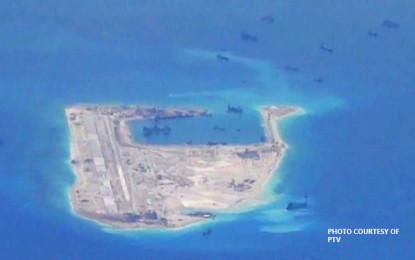
(File photo)
MANILA – President Ferdinand R. Marcos Jr. is wooing his fellow leaders at the Association of Southeast Asian Nations (ASEAN) to craft a new code of conduct (COC) to ensure peace in the South China Sea (SCS).
This, after Marcos lamented the “slow” negotiations on the proposed COC in SCS between ASEAN and China.
“We are now in the midst of negotiating our own code of conduct ,for example, with Vietnam because we are still waiting for the code of conduct between China and ASEAN and the progress has been rather slow unfortunately,” Marcos said during the Daniel Inouye Speaker Series at the Asia-Pacific Center for Security Studies in Honolulu, Hawaii on Monday (Manila time).
“And so we've taken the initiative to approach those other countries around ASEAN with whom we have existing territorial conflicts,” he added.
Marcos said Vietnam and Malaysia are among the Southeast Asian nations he is trying to convince to come up with another sea code to maintain peace in the SCS.
“Hopefully, this will grow further into the other ASEAN countries and at the very least, we have that basis, not only in the multilateral sphere as in ASEAN or APEC (Asia-Pacific Economic Cooperation), all of these other organizations but also bilaterally with the different countries around ASEAN whom we have conflicts with, but with whom, I think, we can find a way to maintain the status quo,” he said.
Marcos has been pushing for the conclusion of negotiations for the binding COC in SCS.
China, the Philippines, and several other littoral states have overlapping claims in the South China Sea.
Beijing is claiming about 80 percent of the contested waters.
However, the Hague-based Permanent Court of Arbitration on July 12, 2016, ruled against China’s supposedly historic rights over nearly the entire SCS.
Marcos said the Philippines would continue to strengthen its partnership with the United States (US), the country’s only treaty partner, as well as with other like-minded nations and allies.
He said the move is to improve ties with “all friendly nations [that] share our ideals, aspirations, values and the respect for the rule of international law.”
“And this has been something that we have tried to develop and we have, I believe, have had some measure of success and we will continue to do this. But again, the bedrock of any of these partnerships is the partnership and treaty arrangement that we have, the Mutual Defense Treaty that we have with the United States,” Marcos said.
Marcos stressed that the US has always been behind the Philippines in terms of support, not only in rhetoric, but also in providing concrete support.
He added that the Philippines also receives similar backing from Australia, South Korea and Japan.
Aside from getting support from its partners, the Philippines continues to increase its capabilities to respond to the challenges that it is facing, especially as China’s island-building efforts edge closer to Philippine shores, with its more confrontational stance, Marcos noted.
“Now it's becoming more and more often. Every so often, there is a confrontation between outside forces and Philippine forces,” he said.
Public awareness
Senator Robin Padilla on Tuesday urged the Presidential Communications Office (PCO) to raise public awareness of the issue on the West Philippine Sea (WPS) to counter the propaganda of misinformation and fake news.
In filing Senate Resolution 864, Padilla urged the PCO to "communicate to the public in an understandable way" the relevant legal documents, international treaties, and bilateral and multilateral agreements on the government's actions in the WPS.
"As the nation's security landscape continues to evolve, it is incumbent upon the PCO to provide clear, up-to-date, and accurate information on matters of public concern relating to the security challenges confronting our country," Padilla, chairperson of the Senate Committee on Public Information and Mass Media, said in his resolution.
He said the territorial claim in the WPS remains a primary national interest in the Philippines.
Under Padilla's resolution, the PCO is to communicate to the public various treaties and documents that served as the basis of the Philippines' policies and actions surrounding the territorial dispute in the WPS.
These include the United Nations Convention on the Law of the Sea; the 2016 Permanent Court of Arbitration ruling that invalidated China’s nine-dash line claim in the SCS; the United States - Philippines Mutual Defense Treaty and the Reciprocal Access Agreement.
"It is understood that matters that may have repercussions or may compromise the nation's defense and security are naturally excluded from any public information and awareness campaign," he added. (With a report from Leonel Abasola/PNA)
